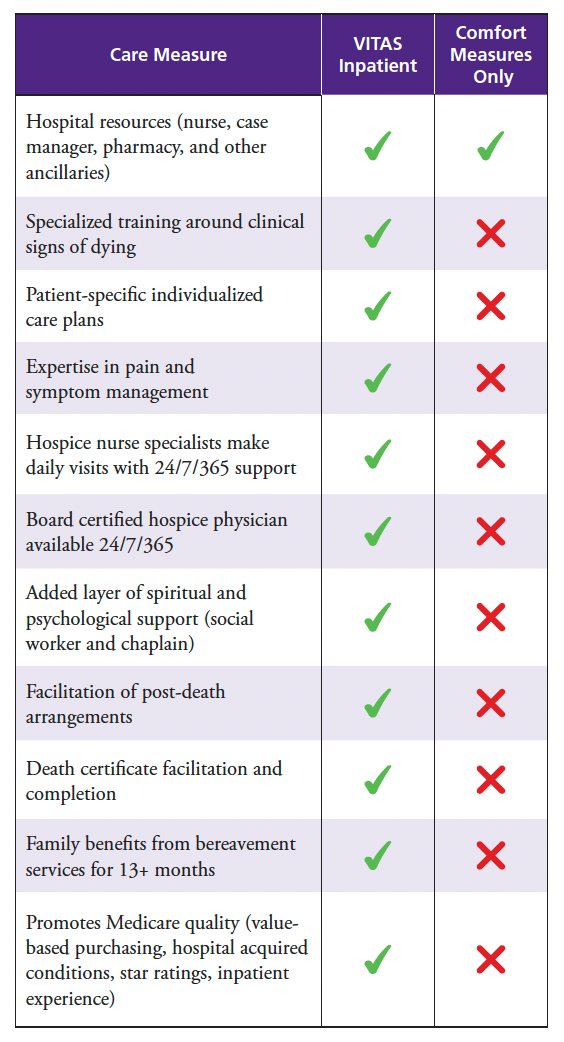By Joseph Shega, MD, Executive Vice President and Chief Medical Officer, VITAS Healthcare
When a hospitalized patient's condition reaches a point where curative treatment no longer offers benefits and the patient is actively dying, healthcare professionals are faced with a decision. Should you recommend general inpatient (GIP) hospice care Comfort Measures Only (CMO)?
Though both approaches prioritize comfort over non-beneficial curative care, understanding the differences is crucial to help inform the best choice for your patient and their family.
Understanding the Difference Between Comfort Measures Only and General Inpatient Hospice Care
Comfort Measures Only
CMO ceases curative treatment and focuses exclusively on relieving discomfort, pain, and distress for patients nearing the end of life. It is often implemented during a hospital stay with appropriate medications and bedside care.
However, CMO is not a full care program and does not include the additional layers of support that the majority of patients and families need during the end-of-life transition.
General Inpatient Hospice Care
GIP is a structured, comprehensive program designed to enhance the quality of life for dying patients. It addresses physical, emotional, and spiritual needs through a team-based approach. If a GIP patient is discharged from the hospital, hospice care can continue in multiple settings, including assisted living facilities, nursing homes, and private residences.
Hospice support extends to the patient’s family no matter where the care is provided.
The critical distinction between CMO and GIP is the latter’s ability to provide more than just medications for patients to try and alleviate symptoms. GIP delivers a full continuum of support services to ensure both patients and their families feel seen, heard, and supported throughout this universal experience.

Benefits of General Inpatient Hospice Care
Referring a patient to GIP offers distinct advantages that go far beyond what CMO can provide.
Expertise in Pain and Symptom Management
GIP includes physicians board certified in hospice and palliative medicine, and comprehensive care teams highly skilled in addressing complex symptoms such as pain, agitation/restlessness, and respiratory distress. Every treatment plan is individualized, ensuring optimal comfort for patients.
Holistic, Patient-Centered Approach
GIP addresses the whole person, incorporating physical, emotional, and spiritual elements in line with the patient’s care goals. Social workers and chaplains provide added guidance, helping patients and families cope with feelings of grief, confusion, and loss.
Support for Families
Unlike CMO, GIP support extends to the family. The hospice care team helps educate families so they can prepare for the physical and emotional changes that the patient may experience, including clinical signs of dying. They help families navigate anticipatory grief and provide bereavement support and resources for up to 13 months after a patient has passed away. The hospice care team can also support post-death arrangements, including facilitation and completion of the death certificate.
Accessible, Around-the-Clock Care
Hospice care guarantees 24/7/365 availability of board-certified physicians, hospice nurse specialists, chaplains, and social workers. Whether it is a medical crisis or the family needs psychosocial support, the care team is available whenever they are needed.
Beyond Comfort Measures
While Comfort Measures Only care can try to address immediate patient needs within the hospital setting, hospice care offers a more comprehensive, compassionate, and specialized approach that extends far beyond the hospital's walls. From evidence-based protocols in pain and symptom management to emotional and spiritual support, hospice care ensures that patients and families receive meaningful, dignified care during life’s most vulnerable moments.
By understanding the benefits of hospice and recognizing when it is appropriate to make a referral, healthcare professionals can profoundly impact their patients’ experiences and outcomes.
Take the Next Step
If you’re considering hospice services for your patients, choose a trusted partner like VITAS Healthcare. As a pioneer and national leader, VITAS offers unparalleled support to patients, families, and the medical community. Learn more or make a referral today.

